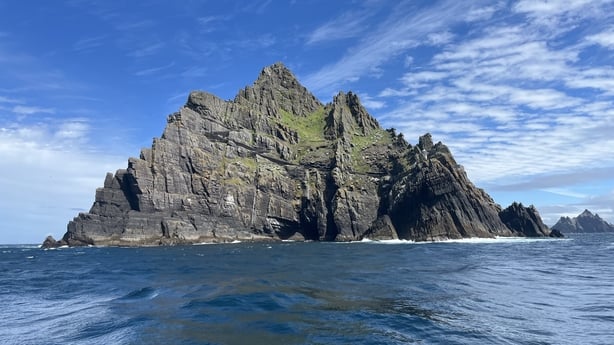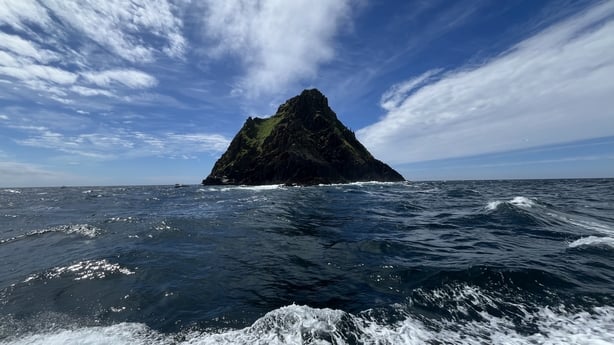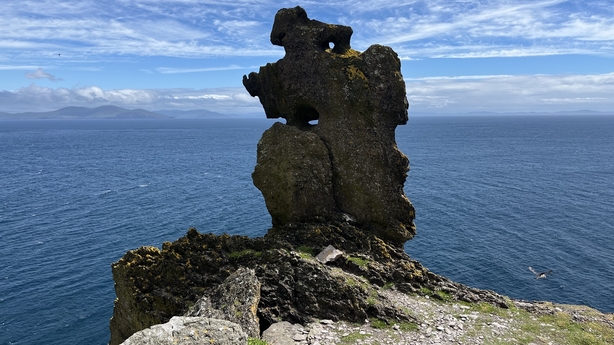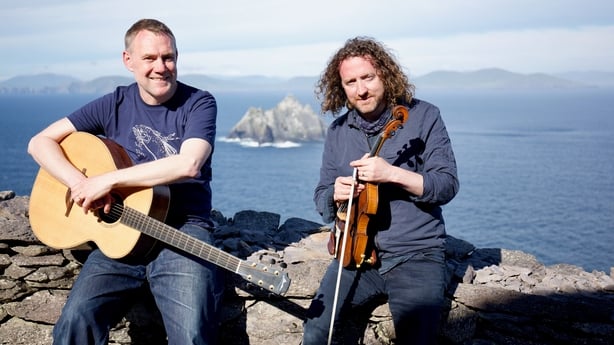RTÉ brings Culture Night 2024 to RTÉ One on September 20th with a joyful celebration of our cultural landscape.
As part of this unique programme, singer-songwriter David Gray got to make his first ever trip to Sceilg Mhichíl, a place which has fascinated him for years - to such a degree that his last album was called Skellig. He was joined on this musical journey by his friend, musician and composer and member of The Frames Colm Mac Con Iomaire. Watch a preview above...
Below, programmer maker Donal Scannell recounts a remarkable trip with the duo.
There's no why with David Gray’s Sceilg fascination. The concept of the island grabbed him from the first time Donal Dineen told him of it, sometime back in the day. Fast-forward decades and it’s finally happening. David’s debut trip to Skellig Michael.
Like all Sceilg Mhichíl trips, this one almost didn’t happen. We’re sitting in a standard issue holiday home kitchen near Portmagee, staring out the window at bad weather as David recalls an intrepid adventurer’s biography he’d read. He shares that this adventurer reckoned that the hardest journey he’d ever made was that to Sceilg Mhichíl In the depths of our collective despair, what could we do but find some solace in the knowledge that our pain wasn’t unique?
We are David, myself and Colm Mac Con Iomaire. David and Colm have known each other since way back in the day. Their shared passion for all things wild makes them seem like separated twins.

It was the story of the monks forsaking the world for the wilds of the west that first attracted David to Sceilg Mhichíl, but it’s their birdlife that really excites both Colm and himself. The pair of them are giddy with excitement - even the looming threat that we may not get there doesn’t dim them.
Day three and we make it.. Skipper Paul Devane and crew are giddy too as they drop us out. The sun is shining as we hit land and David and Colm are off like released rabbits, bounding up the steps once they’ve completed the safety talk. It’s hours before we see them again.
The duo wander around, gorging themselves on the wonders before them as we remain at the bottom of the island, gathering clips of wonderful wildlife. When we make it to the top, we get to talk about what they’ve seen and how they feel about it after they record two pieces of music for the RTÉ Celebrates Culture Night cameras - a decades-in-the-making version of the title track from David’s Skellig album and Colm’s rendition of a tune inspired by the very waters that surrounded us - Port na bPúcaí.

As Colm explains, Port na bPúcaí "is not a very old song or tune. It's quite recent, as in it's from the 20th century, There was a fisherman from the Blasket Islands, Muiris Ó Dálaigh, also a musician. He was becalmed in his naomhóg, which is a currach. When the mist came in, he pulled the oars in and he heard this music coming in across the water, and he remembered the tune and he brought it back home with him. He called it Port na bPúcaí. The púcha is related to the fairies and the spirit world. And interestingly, somebody has had a theory about what actually might have happened, that the naomhóg worked like a speaker cone and actually carried a whale song up to the boat, and that he brought a whale song home. So if there ever was a sacred place to play this music and to honor the place, it's the Port na bPúcaí. It feels like a metaphor for today."
"This is an incredible memorial to the kind of devotion the monks created here and the lives that they lived. It's almost beyond my imagining."
David is blown away by the harmonious choice of music: "Skellig starts with 'Oh, that the song I'm singing / Was an ocean wide / And that the word I'm bringing / Reaches over to the other side’. My idea was that a whale song is actually ocean wide. These incredibly low bass songs from blue whales, they think they could go across an ocean. I used that idea for the beginning of that song. That's a rather lovely synchronous thing that you've just said. Remarkable."
I ask whether coming to Sceilg Mhichíl was a pilgrimage for them.
"In a way we've been waiting," begins David, "biding our time, waiting for permission to land. I like the idea that in Irish we call passage tombs 'cromleac' - 'crom' is to stoop and a 'leac' is a slab. And in a way, you need to bow your head to enter into this place. Somehow these places have that about them, that you need to approach with humility. And so we're just incredibly grateful for the magic today."

How long have you wanted to come here, David?
"Well, I guess ever since I was first told of the Sceilg Islands and this place, this monastery, this remarkable poem in stone that's been written to spirituality, and you can call it God or you could say looking at the face of infinity, whatever they were trying to contemplate, just the devotion to contemplation and silence and the austerity of existence and also the incredible abundance of natural life.
And there is a stillness, there's a kind of quiet here that you just cannot find unless you get off the mainland. So all those things fueled my imagination when probably nearly 20 years ago I was told about someone else's journey here and these hand-cut steps. And it just sowed seeds in my imagination that then bloomed into the song that I've sung today. So in my song 'Skellig’ the last verse is all about cutting the steps up to the high rocky plateau and making a home inside the winds.
Nature is so mysterious but so is human yearning. Just to take things to such extremes, I know there are all kinds of historical reasons, Christianity and learning and books were all on the run. They were sort of burning ideas in medieval Europe. There was the idea of preserving things but also it was getting closer and closer to the infinite, to God.

And that idea of what music is, it's some kind of magnifying glass. It's an elevated form of conversation when you're singing. There's a taproot that goes down into something deeper. This is an incredible memorial to the kind of devotion the monks created here and the lives that they lived. It's almost beyond my imagining. The idea that people took it to such extremes, I'm absolutely captivated by. It's so different than the sort of, the hullabaloo that we're so used to living in the 21st century world of technology and sort of nuclear bomb of communication that was dropped on us all in multiple times through television, radio and all these things that have fractured our heads and our hearts.
This place is about stillness, contemplation, devotion and doing without and finding more in the spaces. So I think it's been amazing being here today. I know how difficult it is to get the right conditions to land. So with just a small time window to be blessed by this weather as well and seeing the birds all around. It's been amazing, unforgettable stuff."
It’s very fair to say that David and Colm were both blown away by their experience on Sceilg Mhichíl, and they have asked that we say thanks a million to all of the wonderful staff at the OPW and the NPWS for facilitating this trip.
RTÉ Celebrates Culture Night, RTÉ One, Friday September 20th - catch up afterwards via RTÉ Player.
